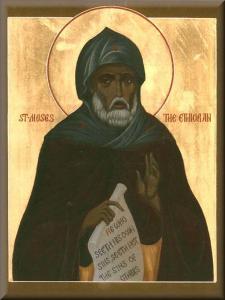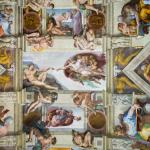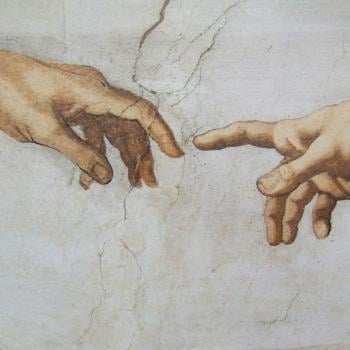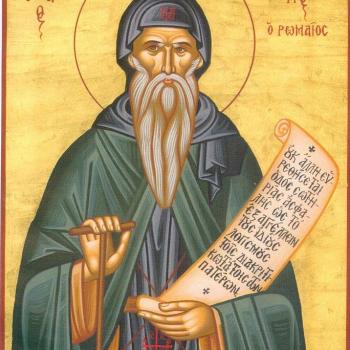
God is always offering us grace, offering us the opportunity to grow and be become better than we are today. The key is not to become complacent, especially in regards our religious faith. If we think we do not have any room to grow, any room for improvement, not only will be become stuck where we are at, we will find we will be, as it were, left behind. Instead of having a living, dynamic faith, our faith will become a dead one. We will be merely reenacting things, trying to put new wine in old wineskins. Indeed, we will start looking backward, to the way things were, and think everything must be like it was in the past, allowing for no growth or development, and so we become stuck looking backwards, to the dead past, which is why our faith will die out, because we will not embrace the Spirit of Life and the new movements it brings today. This is one of the lessons Abba Paphnutius thought St. John Cassian could and should learn from the story of St. Moses the Ethiopian:
Now, with regard to Abba Moses, who lived in the part of this desert which is called Calamus, nothing was lacking for him to be rewarded with perfect blessedness. Impelled by the fear of death which hung over him because of the crime of murder, he betook himself to a monastery. He so seized upon his need to be converted that with a virtuously ready spirit he turned it into a voluntary act and arrived at the highest summit of perfection. Similarly, in opposite fashion, it was of no value to many persons whose names I ought not to mention that they attached themselves to the Lord’s service from a better beginning, when from then on, due to subsequent laziness and hardness of heart, they slipped away into a harmful lukewarmness and into the deep abyss of death.[1]
It might sound as if Moses was simply a murderer, and that he became a monk to escape the consequences of his crimes. That was not the case. He was a slave, and initially learned his way of the world as a slave. He learned that the strong took what they wanted by force, and the weak suffered at the hands of the strong. He took that lesson well. He didn’t want anyone to control him, and that meant, he would be the one using force on others. When he was able to be freed from slavery, he took this attitude with him, and it led him to become a brigand, making his way in the world by robbing others. It did not do him well. He became a wanted man, and his life was put in danger. And so, he took flight, trying to hide himself from the authorities, and it was in this flight from danger he made his way into the desert and found himself welcomed by and helped by a monk. All he had done before that time, to be sure, was not good, but how culpable was he, when he didn’t have free agency, when he learned how to live in and through the systematic injustice he couldn’t resist? Those who made him a slave and abused him are at least equally culpable for what he did. But, upon taking refuge in the monastery, he learned a new way of life, one of grace, peace and love, and it was something which he took to heart. He became a Christian, and then a monk, not to ignore his past, but to take on a life of penance, showing that, even with grace, he knew he had to face the consequences of his actions. But now, he could and would face them with the help of God, which is why his penance could transform him and make him a new man, putting the person he had previously been to death; he became a man of peace, a man of compassion, and a man of much great wisdom. He was able to attain a level of perfection rare in the world. And yet even then he accepted, at the end of his life, that he would suffer a brutal death as a consequence of the way he previously lived his life, so that even in the monastery, he did not escape justice but faced it with grace, and through such acceptance, he was able to show the world the greater way he learned in the monastery.
Moses represents what is possible when someone is open to grace. He might not have started off well, but grace was able to take the good in him and perfect him, so that in the end, he died, not as a representative of violence, but as a representative of peace. He did not defend himself when his monastery was attacked; rather, he embraced the violence so as to show the world what comes of it.
On the other hand, so many people start off well, but then close themselves off from further growth. In the end, they cut themselves off from grace and instead of being perfected, they find themselves being slowly corrupted, and as a result, their lives become very dreary and distasteful to them. Since they do not allow grace to transform them and make them better, they experience everything in and through the lack of that grace, making all things appear and seem to be dead to them. Not only do they not know joy, they have no room for it. They presume that what they previously did should provide them all they need, but as their life goes on, the more they stifle anything and everything which could lift themselves out of their ongoing degradation.
We should not let our past define us. It might be prologue. It might explain where we have come from, but it does not have to tell us how things must end. What we have done will have consequences, but even those consequences do not have to represent the full story. We can open ourselves up to grace and through it, find we become better, indeed, greater than what our past says about us. Everyone is capable of being made better. Moses shows us this. He was not defined by having been a slave, nor for having been a robber, though both of those are, to be sure, elements of his life and not to be forgotten; he is defined, not by how be begun his journey, but by what he allowed himself to become at the end of his life. We, then, should truly learn from this example. We should not let greatness slip away from us by letting our past define us. God’s grace is always there. With it, we truly can become so much better.
[1] St John Cassian, The Conferences. Trans. Boniface Ramsay, OP (New York: Newman Press, 1997), 122-23 [Third Conference, Conference of Abba Paphnutius on the Three Renunciations].
Stay in touch! Like A Little Bit of Nothing on Facebook.
If you liked what you read, please consider sharing it with your friends and family!
N.B.: While I read comments to moderate them, I rarely respond to them. If I don’t respond to your comment directly, don’t assume I am unthankful for it. I appreciate it. But I want readers to feel free to ask questions, and hopefully, dialogue with each other. I have shared what I wanted to say, though some responses will get a brief reply by me, or, if I find it interesting and something I can engage fully, as the foundation for another post. I have had many posts inspired or improved upon thanks to my readers.













